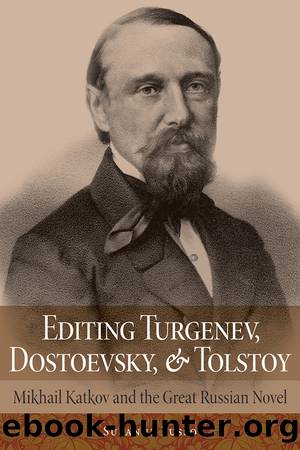Editing Turgenev, Dostoevsky, and Tolstoy by Susanne Fusso;

Author:Susanne Fusso; [Fusso, Susanne]
Language: eng
Format: epub
ISBN: 9781609092252
Publisher: Lightning Source Inc. (Tier 3)
The work that depicted a Russian family âin connection with Russian historyâ is War and Peace; and the âmisanthropic grandsonâ is Liovin in Anna Karenina.15
No reactions by Tolstoy to either Avseenkoâs articles or Dostoevskyâs ending to A Raw Youth have come down to us. But as publication of Anna Karenina resumed in early 1876, contemporary issues of the kind that were to be banned from the Non-Contemporary began to occupy a much more prominent place in the novel, most strikingly in the scene of the dinner party at Stiva Oblonskyâs (February 1876), in the extensive summary of Liovinâs book on agriculture (April 1876), and continuing to the novelâs controversial end. It is as if Tolstoy was demonstratively rejecting any idea that Anna Karenina is a historical novel, untouched by what Nikolai Semionovich calls ânostalgia for the present moment [toska po tekushchemu]â (Dostoevskii, PSS, 13:455). It is this engagement with current events that led to Tolstoyâs violent break with Katkov in the spring of 1877.
It is well known that Katkov refused to publish the eighth and final part of Anna Karenina, probably because of its harsh treatment of the movement of Russian volunteers traveling to Serbia to assist the âbrother Slavsâ in their struggle with the Ottomans, and that Tolstoy had to resort to publishing it as a separate brochure. What is less obvious is that part 8 of Anna Karenina is only the most blatant and explicit attack on some of Katkovâs most favored policies and programs to be found in it. In his extensive, illuminating work on Anna Karenina and its context in print culture, Todd has pointed out that the Russian Herald published articles on many of the current topics discussed by the characters in Anna Karenina.16 But the directedness of Tolstoyâs novelistic discussions against the policies of Katkov and the Russian Herald merits further study. The attack on the Russian volunteer movement in part 8 was not a sudden, unanticipated burst of negativity towards one of Katkovâs pet causes; it was only the last in a series of such attacks within the novel, and no doubt had the effect of a last straw. To understand the context of Katkovâs rejection of part 8, it will help to consider in some detail the ways in which Anna Karenina, both in its initial general conception and in its intensified engagement with current events beginning in February 1876, is permeated by opposition to the program of Katkovâs journal, that program that Katkov had been vigorously defending since the journalâs inception twenty years before.
Download
This site does not store any files on its server. We only index and link to content provided by other sites. Please contact the content providers to delete copyright contents if any and email us, we'll remove relevant links or contents immediately.
The Power of Myth by Joseph Campbell & Bill Moyers(925)
Half Moon Bay by Jonathan Kellerman & Jesse Kellerman(908)
A Social History of the Media by Peter Burke & Peter Burke(879)
Inseparable by Emma Donoghue(844)
The Nets of Modernism: Henry James, Virginia Woolf, James Joyce, and Sigmund Freud by Maud Ellmann(738)
The Spike by Mark Humphries;(719)
The Complete Correspondence 1928-1940 by Theodor W. Adorno & Walter Benjamin(703)
A Theory of Narrative Drawing by Simon Grennan(703)
Ideology by Eagleton Terry;(655)
Bodies from the Library 3 by Tony Medawar(647)
World Philology by(645)
Culture by Terry Eagleton(643)
Farnsworth's Classical English Rhetoric by Ward Farnsworth(641)
A Reader’s Companion to J. D. Salinger’s The Catcher in the Rye by Peter Beidler(613)
Adam Smith by Jonathan Conlin(605)
Game of Thrones and Philosophy by William Irwin(592)
High Albania by M. Edith Durham(589)
Comic Genius: Portraits of Funny People by(581)
Monkey King by Wu Cheng'en(575)
